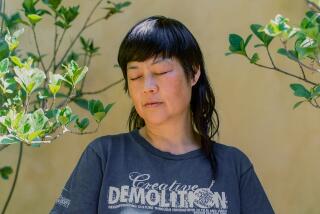A film career that came by special order
- Share via
The story behind how “Dim Sum Funeral” director Anna Chi ended up becoming a filmmaker is, alone, the stuff of great screenplays. After all, how many successful, L.A.-based filmmakers can say that, in effect, Chairman Mao Zedong and the Chinese Communist Party got them into the movie business? Chi can, and, though it was a long, often difficult journey, she still looks back at her early life as a child of China’s Cultural Revolution with a mix of wonder and resignation.
“If you asked me today, I don’t know that I’d say I hate or love [the Communist Party] because all my experience is from that very manipulated and in a sense innocent kind of child’s point of view,” said Chi, who at 9 became immersed in the start of the Cultural Revolution after a letter she wrote to her party-resistant father praising Chairman Mao inadvertently turned into a touchstone for communist ideology.
Over the next nine years, Chi became a member of the Communist Youth League and then a member of the Communist Party. As one of the privileged “Red Guards,” Chi led a traveling propaganda team that spread the word of Chairman Mao and later worked and lived in the countryside as a “peasant.”
“I didn’t think it was crazy at the time,” recalled Chi, 51, by phone from her Mar Vista home, where she was recuperating from hip surgery. “I thought these were great activities. You got to sing, you got to go to meetings and rallies and dances. It was very fun in a way since I was an only child and I guess always very lonely. I never got that much attention from anybody.”
Mao’s death in 1976 ended the Cultural Revolution, and Chi’s focus on party politics waned along with it. Still, as one of 10,000 students originally selected by Mao to attend college, Chi went on to study literature -- the party’s choice for her -- in Guangzhou (formerly Canton).
Though Chi expected to ultimately work as a journalist or a book editor, the party randomly decreed she would become a film editor. Despite zero background in cinema, Chi began working at a Beijing movie studio. “I started my film career by accident, by force,” she noted.
By the late 1980s, after her party-arranged marriage that ended in divorce, a growing independent streak and an ever-widening departure from communist philosophy, Chi realized “they [the party] will win and I will have to give in” and that it was time to leave China. On the advice of friends who had moved to the U.S., Chi immigrated to Los Angeles with her 3-year-old son, even though she was wary about her destination. “To me, America was the No. 1 enemy to China,” she said.
Nonetheless, Chi learned English and was eventually accepted into UCLA’s film school. Her first job after graduation was to help cast the Mandarin-speaking roles in “The Joy Luck Club,” on which the film’s director, Wayne Wang, subsequently hired Chi as a production assistant. Fourteen years later, after working in various capacities with such filmmakers as Oliver Stone (on “Nixon”), Jon Avnet (“Red Corner”) and Chen Kaige (“Killing Me Softly”) as well as directing and co-writing the independent thriller “Blindness,” Chi reunited with Wang to direct the Mandarin-language scenes in his Seattle-set family drama “A Thousand Years of Good Prayers.”
Strained family dynamics and a Seattle locale also factor into the Chi-directed dramedy “Dim Sum Funeral,” which opens Friday. The U.S.-Canadian co-production -- whose large ensemble cast includes Russell Wong, Bai Ling, Steph Song, Julia Nickson, Francoise Yip, Kelly Hu and Talia Shire -- was inspired by an idea Chi hatched several years ago after lunching with a friend from Hong Kong who had come to L.A. for her father’s funeral. “She started talking about her father and about the things she wished he’d said to her -- and her to him,” remembered Chi. “I thought, ‘Wouldn’t it be nice, before we died, if we could actually hear what other people had to say about us, especially the ones we love? We would die with less regret.’ ”
Chi then spun out a story based on various incidents, characters and relationships from her own life, placing an Asian American family’s reunion for the mother’s traditional Chinese funeral at its core. As funding came in, Chi enlisted screenwriter Donald Martin, with whom she had previously collaborated on a script for Miramax, to take over the writing reins.
Though the script paints its late matriarch Mrs. Xiao as a “dragon lady,” Chi wasn’t worried that the character’s anti-mom status would distance viewers. “If the mother’s a sympathetic character, it’s easier for everyone to love her and there’s no problem,” said Chi. “It’s more difficult and, to me, more interesting to love and accept someone who is not so sympathetic. If [Mrs. Xiao’s] children can forgive her, then audiences should be able to.”
Chi, who acknowledges parallels between the flawed Mrs. Xiao and her own mother, hopes “Dim Sum Funeral” will move people to “go home, pick up the phone and call their mother, just to say how much they love her.” She added, with a meaningful pause, “Before it’s too late.”
--
More to Read
Only good movies
Get the Indie Focus newsletter, Mark Olsen's weekly guide to the world of cinema.
You may occasionally receive promotional content from the Los Angeles Times.










